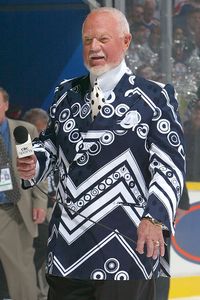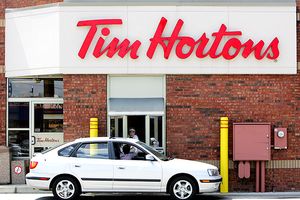http://sports.espn.go.com/nhl/columns/story?columnist=frei_terry&id=3327990
EDMONTON, Alberta -- It is during the third period in Edmonton. The Oilers' Ales Hemsky already has made two inspired plays, but he is at rest when one of the game's most pivotal and much-anticipated moments arrives.
The public-address announcer tells us to get out our 50-50 tickets and reveals that the winner's share of the pool is $30,000.
Thirty grand!
During the first 50 minutes of play, as we've been waiting for this moment, we make plans for the money. Buy a car. Take the vacation of a lifetime. Or, heck, depending on the section, even pay for two or four season tickets for 2008-09.
Then the announcer reads aloud the winning number as it also is flashed on the Rexall Place scoreboard.
Glances confirm, among other things, that the winner is not seated in the press box.
The 50-50 drawing at NHL games is not confined to Canada, but Canadians do it up right.
Better than Americans.
And let's face it, that's true for a lot of things.
One of the great aspects of covering hockey for so long is I've gotten to make so many trips to Canada. At first, I felt almost as awestruck as James Cook, John Cabot or Samuel de Champlain must have been in their explorations. By now, it's old hat, yet still invigorating.
When it comes to hockey, for many reasons, the more Canadian teams involved in the Stanley Cup playoffs, the better. A Montreal-Calgary final would be a blast.
It's energizing and contagious when the playoff chase involves Canadians, who have favorite-team emotional stakes in the proceedings, rather than more dispassionate fans of the sport and individual players, but not the teams themselves.
As of this writing, three Canadian-based teams -- Montreal, Ottawa and Calgary -- are in what would be playoff spots, and Vancouver has a chance of overhauling Nashville. That's assuming the Senators don't complete their stunning collapse and fall out of the field altogether.
What makes Canada so invigorating to visit, whether during the playoffs or any other time?
Many things, among them:
• Canadians don't just have a great anthem. They also have one they can sing. And they do. After decades of attending events in the U.S. and hearing the single-shot anthem singers doing solo acts, and often turning "The Star-Spangled Banner" into an over-the-top "American Idol" performance, it's refreshing to hear the Canadians singing along.
• "Centre" and "defenceman" and "honour" just seem classier.
• Wendy's bought Tim Hortons a few years back and, after some subsequent ownership maneuvering, the two still are intertwined, and often in the same building. But for some inexplicable reason, Timbits or an apple fritter, plus Tim Hortons coffee, remains a better breakfast than anything we can get anywhere on this side of the border (except in the few U.S. markets with Hortons outlets).
• Three downs, a 55-yard line, a single-point rouge and motion before the snap all make the CFL fun to watch, even if there no longer are both Rough Riders and Roughriders in the league. (It will be great, though, if Ottawa interests get their ducks in a row and the capital city gets another team and its 39th try in the league.)
• Receiving Canadian "loonie" and "toonie" coins as change seems to make everything more convenient. Getting a U.S. Sacagawea dollar coin back from the stamp machine seems to make everything more complicated, especially when you mistake it for a quarter and try to put it in a parking meter.

Jim McIsaac/Getty Images
Don Cherry is known as much for his suits as his strong hockey opinions.
• And on the subject of money, Canadians are nice enough not to complain -- much -- about the inequity of how they're almost always willing to accept U.S. money, and at a fair exchange rate (whatever that is at any given moment), yet if they visit the U.S., merchants look at them as if they have just tried to pay with Monopoly money if they pull out Canadian bills or coins. Plus, Canadian writers don't get offended -- not much, anyway -- when after a player gets a congratulatory phone call, U.S. writers turn to the Canadians in the press box and ask, "What's your prime minister's name again?"
• Barenaked Ladies made it big a long time ago. Yet, thankfully, the Canadian group didn't stop singing, "If I Had a Million Dollars."
• Canadian highlight shows gleefully jump in to play the fighting clips, too -- but they also show most of the goals.
• The panel and interview show "Off the Record" is a model some U.S. shows could follow. Smart and entertaining, at the same time. What a concept.
• Don Cherry doesn't mellow. And that's good because of the entertainment value and the depth of his passion and his in-the-trenches background and knowledge. Yet, one of the most overlooked aspects of hockey coverage is that the most vigorous and intelligent discourse about the state of the sport -- whether in the aftermath of a Todd Bertuzzi attack or a major-junior melee featuring a high-profile father and son, or even during a routine week -- is in Canada. And the smart fans know they can't just say You don't understand the game when someone disagrees with the premise, for example, that the instigator rule is responsible for global warming. Canadians tend to be far more capable of acknowledging gray areas and subtleties, and the debates contribute to the public good, rather than involve preaching to separate choirs. And that's in everything, not just hockey. I also guess that's why Canadians don't need, among other things, laugh tracks.
• Yes, Canada has great "sitcoms," with humor (or humour) so dry and clever, the shows induce smiles and smirks and require actually thinking to get the "jokes." And, no, they don't have laugh tracks. If you haven't seen one of the Canadian shows, a good way to get a sample is to order "The Newsroom" on DVD or catch "Corner Gas" when it is replayed on Chicago's WGN. Both crack me up, without making me guffaw out loud.
• Canadian sportswriters and sportscasters have the knack of being able to use words like "helpers" and "markers" and "netminder" without making it sound hackneyed. On the other hand, some wings of Canadian journalism have imaginative definitions of the term "source," since it can be anything from an agent to a stick boy's uncle's barber.
• Chapters seems to be better than certain U.S. chains I won't name at stocking books by authors -- both American and Canadian -- you've never heard of but stumble across, give a try and immediately enjoy. And then there are the authors well-known in Canada, but not in the U.S., who more easily are spotted in the Canadian stores, such as historian Pierre Berton or novelist Mario Ricci. Plus, in the sports section, there are more hockey books than you can shake a CCM stick at. Most of them are good, especially compared to the regionalized "formula" works cranked out by the handful of U.S. "sports mill" publishers.
It sinks in after a while that Canada's population is far more diverse than we give it credit for, in part because Canadians take diversity for granted and are less prone to brag about it, calculate it, or even require it. But it's fun to hear a cab driver from Pakistan, in heavily accented English, tell you that Canucks coach Alain Vigneault should have his head examined for making Trevor Linden a healthy scratch so many times this season and the Sedin twins still need to take it to another level.
Alas, you now can tell that folks from the Canadian franchises attend the same league marketing meetings as the folks from U.S. franchises -- some of the "game presentation" ridiculousness that produces generic spectator experiences has made it over the border. But at least in Canada, the music doesn't always sound as if it has been selected by a 19-year-old with purple hair in the sound booth who doesn't know the color of the blue line.
And most important of all: Curling can grow on you.






No comments:
Post a Comment